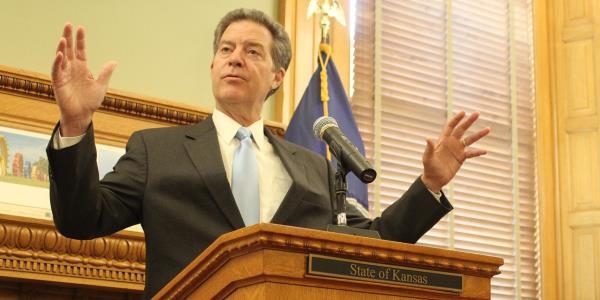President Donald Trump has nominated Kansas Governor and former U.S. Senator Sam Brownback to serve as Ambassador-at-Large for International Religious Liberty. Brownback will head the Office of International Religious Freedom in the U.S. Department of State.
Governor Brownback served in the U.S. Senate from 1996 to 2011, and before that, served in the U.S. House. From 1995 to 1996. Brownback came to the attention of many during his campaign for president which began in February 2007 and ended that October. Brownback has served as governor of Kansas since 2011.
The week of the Trump Administration’s announcement, praise for the choice of Gov. Brownback began to come in. Liberty Counsel issued a news release which included this:
While a member of the Senate, [Brownback] worked actively on the issue of religious freedom in multiple countries and was a key sponsor of the International Religious Freedom Act of 1998.
Mat Staver, Founder and Chairman of Liberty Counsel, said:
I commend President Trump for nominating Gov. Sam Brownback as Ambassador-at-Large for International Religious Freedom at the State Department. Innocent people around the world are imprisoned, tortured, and persecuted for their faith. Christians and religious minorities are suffering more persecution than at any time in history. Gov. Brownback has proven that he will fight for religious freedom and will do an excellent job defending this sacred freedom around the world.
The Washington Examiner reports that Montserrat Alvarado, executive director of The Becket Fund, a non-profit religious liberty law firm, praised the choice in a press release:
Gov. Brownback’s legacy of promoting and defending religious liberty both in the United States and overseas is strong. As a U.S. Senator, he was one of the [motivating] forces behind the passage of the International Religious Freedom Act of 1998, key legislation that ensures that the policy of the United States will be to support religious liberty internationally. His robust experience defending religious freedom for people of all faiths makes him uniquely qualified to lead America’s international defense of this most sacred and fundamental of human rights, religious freedom.
Russell notes that Brownback’s nomination and President Trump’s appointment of conservative judges is a sign that the president is “prioritizing religious freedom.”
In the Washington Free Beacon, Paul Crookston reports:
Brownback became a leader on human rights when he was in the U.S. Senate, during which time he visited Darfur, Sudan, and reported back that the region was seeing a genocide. Former Virginia congressman Frank Wolf, who helped create the ambassadorship for religious freedom, said that Brownback was a great choice.
“This job is really made for Sam,” Wolf told the Kansas City Star. “On all these issues he’s been there before almost anybody else.”
. . .
“Senator Brownback will, I sincerely hope, see this position as contributing to the national security of the United States,” said Tom Farr, president of the Religious Freedom Institute. “Advancing religious freedom in our foreign policy will help Christians and other religious minorities around the world who are suffering persecution.”
CBN News reports that “David Curry, CEO of Open Doors USA, says Brownback is a “’strong choice.’” “Open Doors USA is an organization that supports persecuted Christians all over the world.”
[Curry] says 200 million Christians are currently experiencing persecution around the world, but hopes Brownback can use the United States’ relations with partner nations to address the problem.
“(Christian persecution) is a major issue, and we want to see this brought to the forefront in trade deals,” he said. “We had deals with India and Saudi Arabia. This wasn’t talked about.”
“I think (Brownback’s appointment), it’s going to elevate the position and make this the critical position it really needs to be,” he said. “Because these issues are central to what’s going on around the world.”
Predictably, the reaction from the LGBTQIA(etc.) “community” has been less positive. This is not a surprise, since they believe their homoerotic desires trump the U.S. Constitution’s 228-year-old protection of religious liberty.
The U.S. State Department outlines the Office of International Religious Freedom’s mission as that of “promoting religious freedom as a core objective of U.S. foreign policy”:
We monitor religious persecution and discrimination worldwide, recommend and implement policies in respective regions or countries, and develop programs to promote religious freedom.
Given the U.S. commitment to religious freedom, and to the international covenants that guarantee it as the inalienable right of every human being, the United States seeks to:
- Promote freedom of religion and conscience throughout the world as a fundamental human right and as a source of stability for all countries;
- Assist emerging democracies in implementing freedom of religion and conscience;
- Assist religious and human rights NGOs in promoting religious freedom;
- Identify and denounce regimes that are severe persecutors on the basis of religious belief.
The International Religious Freedom Act of 1998, which created the office, passed both the U.S. House and Senate with overwhelming bi-partisan support, and was signed into law by President Bill Clinton on October 27, 1998.
The U.S. Congressional website notes that the Act “was a response to the growing concern about religious persecution throughout the world.” Almost twenty years later, of course, there is growing concern about the threat to religious liberty in the United States.
The U.S. State Department has just published the International Religious Freedom Report for 2016.

